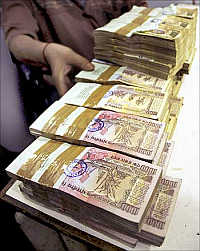 The bugle for the 10th bipartite banking sector wage agreement has been sounded, with five employee unions giving charters of demands for wage revision and service conditions to the Indian Banks' Association last week.
The bugle for the 10th bipartite banking sector wage agreement has been sounded, with five employee unions giving charters of demands for wage revision and service conditions to the Indian Banks' Association last week.An official with IBA confirmed the initial interaction of the union representatives. The officers' union would follow suit. IBA would have to secure the mandate of each bank to negotiate on their behalf. For this, banks would have to secure approvals from their boards of directors.
The ninth bipartite settlement signed on April 27, 2010, between IBA, the All Indian Bank Employees' Association, the National Confederation of Bank Employees, the Bank Employees Federation of India, the Indian National Bank Employees' Federation and the National Organisation of Bank Workers was effective for the period between November 1, 2007, and October 31 this year.
C H Venkatachalam, general secretary of AIBEA, said there was a strong case for a substantial increase in wages and allowances, along with better facilities, owing to consistently high inflation.
He added job profiles had undergone change and there was a sharp rise in expenditure on housing, transportation, health care and education.
In their submission, the unions said the revised wage structure from November 1 should reflect the merger of dearness allowance, payable at the average index for July-September,
They have also demanded the DA be based on the Consumer Price Index 2001=100 series, instead of the 1960=100 series. They said the revision in DA should be according to a monthly variation in the index.
And, every one-point rise or fall in the index should lead to a revision in the DA, they said. The DA compensation should be 110 per cent for clerical staff and 120 per cent for subordinate staff, they said.
The unions said though the business volume had increased, the number of employees hadn't risen. From 4,70,000 as on March 31, 2007, the number of employees had fallen to 4,50,000 as on March 31 this year. About 30 per cent of public sector bank employees across all levels would retire in two to three years.
N Seshadri, executive director of Bank of India, said banks would provide for a wage increase on a pro rata basis from the third quarter of 2012-13.
Seeking a change in the current framework for pension, unions said the New Pension Scheme should be withdrawn and all new employees (from April 1, 2010) covered by NPS should be brought under the Pension Regulation, 1995.
The cost on superannuation benefits should be over and above the negotiated wage cost, they added.











 © 2025
© 2025